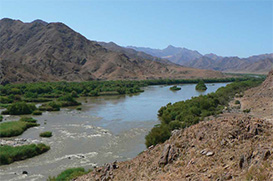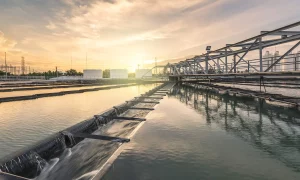Mapping of financial support to transboundary water cooperation in Africa
A new report from the Africa Working Group of the EU Water Initiative, hosted by SIWI, Mapping of financial Support to Transboundary Water Cooperation in Africa recommends that Transboundary Water Resources Management and its high potential contribution to socio-economic development and poverty eradication receive full policy attention from international development partners. Despite an increase since 2007 of the resource flows supporting management of transboundary waters in Africa, it still represents less than one per cent of the entire Official Development Assistance spending in 2011. Far from all development partners make support to development and management of international water basins a priority of their assistance to the water sector in Africa. The report therefore recommends that the donor community works together with African basin organisations for a more coherent, concerted and equitable approach to financing support to the management of shared water, complementing initiatives already funded by basin member states.

A new report from the Africa Working Group of the EU Water Initiative, hosted by SIWI, Mapping of financial Support to Transboundary Water Cooperation in Africa recommends that Transboundary Water Resources Management and its high potential contribution to socio-economic development and poverty eradication receive full policy attention from international development partners. Despite an increase since 2007 of the resource flows supporting management of transboundary waters in Africa, it still represents less than one per cent of the entire Official Development Assistance spending in 2011. Far from all development partners make support to development and management of international water basins a priority of their assistance to the water sector in Africa.
The report therefore recommends that the donor community works together with African basin organisations for a more coherent, concerted and equitable approach to financing support to the management of shared water, complementing initiatives already funded by basin member states.
KEY LESSONS LEARNED
- Not all development partners that support TWM recognise it as an important topic in their policy documents. The majority of the development partners polled have indicated in their policy documents that they provide funds towards to TWM as part of their overall support to water sector development. However, there are still some development partners that make no or little explicit mention of TWM issues in their respective strategies, even though they give financial support to TWM.
- Support for TWM in Africa has increased since 2007. TWM support provided bydevelopment partners in Africa was between 57 and 88 million Euro in 2011. This represents less than one per cent of the entire Official Development Assistance (ODA) spending for the year. The trend however is towards an increase, as in 2007 the range of support was estimated as 34 to 72 million Euro.
- A large share of transboundary basins in Africa are still unsupported. Although the overall support from development partners has increased, the survey found that like in 2007, a large portion of transboundary basins in Africa was still not receiving any support in 2011.
- TBOs have diverse sources of funding, with development partners mainly funding programmatic activities and TBO member states mainly funding core activities. The basins which have functioning TBOs have received support not only from the development partners but also from their member states. Contributions from member states are an important indicator of sustainability of TBOs and show that their objectives are aligned with the interests of the riparian states. Generally the funding sources for TBOs seem to be well diversified among the bilateral and multilateral development partners, EU and non-EU development partners, and the riparian states.
- EU institutions including EC –managed instruments (EC, EIB, including EDF) together make up the single largest multi-lateral supporter of TWM in Africa.
- The fields in which the development partners provide support have shifted from IWRM planning towards institutional strengthening and the development of management instruments. “Strengthening TWM institutions” and “Developing management instruments” were the two most common fields to receive support from development partners in 2011.This is a shift from 2007 when the most common field of support was the development of IWRM plans. A reason for this shift could be that after the JPOI of 2002 there was a strong push towards IWRM planning in the period up to 2007. By 2011 many countries and basins had concluded their IWRM planning processes and moved towards a focus on institutional development and the application of management instruments. In addition, more development partners supported the development of political, legal and financial frameworks in 2007 than in 2011. This represents a natural progression where the legal framework would establish an institutional structure – which then has to be developed.



